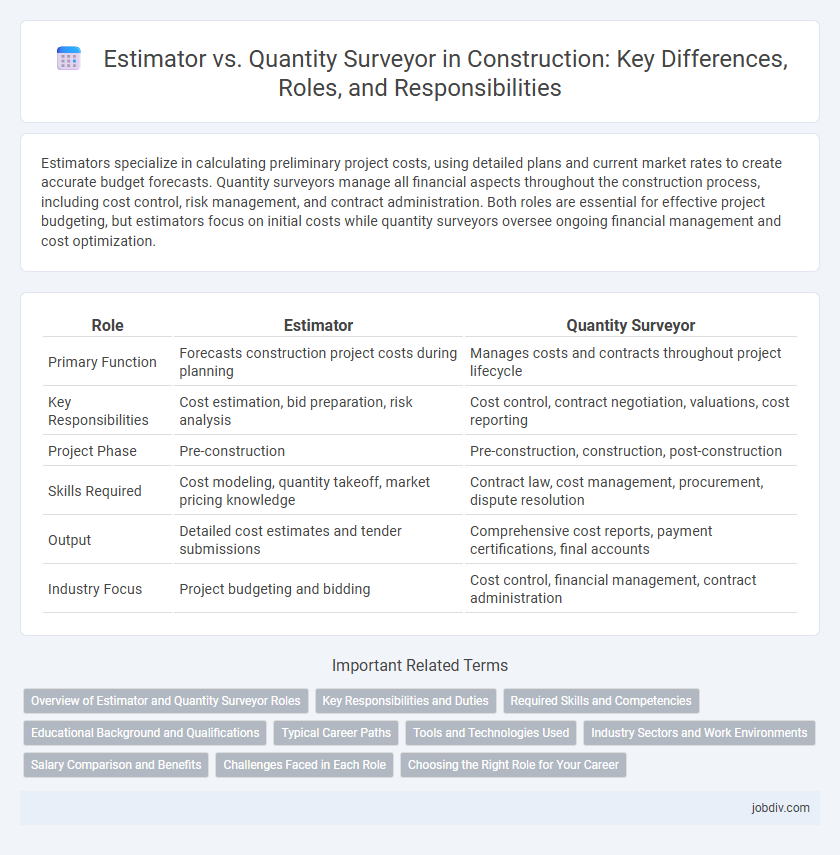Estimators specialize in calculating preliminary project costs, using detailed plans and current market rates to create accurate budget forecasts. Quantity surveyors manage all financial aspects throughout the construction process, including cost control, risk management, and contract administration. Both roles are essential for effective project budgeting, but estimators focus on initial costs while quantity surveyors oversee ongoing financial management and cost optimization.
Table of Comparison
| Role | Estimator | Quantity Surveyor |
|---|---|---|
| Primary Function | Forecasts construction project costs during planning | Manages costs and contracts throughout project lifecycle |
| Key Responsibilities | Cost estimation, bid preparation, risk analysis | Cost control, contract negotiation, valuations, cost reporting |
| Project Phase | Pre-construction | Pre-construction, construction, post-construction |
| Skills Required | Cost modeling, quantity takeoff, market pricing knowledge | Contract law, cost management, procurement, dispute resolution |
| Output | Detailed cost estimates and tender submissions | Comprehensive cost reports, payment certifications, final accounts |
| Industry Focus | Project budgeting and bidding | Cost control, financial management, contract administration |
Overview of Estimator and Quantity Surveyor Roles
Estimators analyze project plans and specifications to calculate accurate construction costs, ensuring budgets align with client requirements and market prices. Quantity Surveyors manage the financial and contractual aspects throughout the project lifecycle, including cost control, procurement, and risk management. Both roles are essential for effective cost planning and financial administration in construction projects.
Key Responsibilities and Duties
Estimators specialize in accurately calculating project costs by analyzing blueprints, material requirements, labor, and equipment expenses to create detailed bid proposals. Quantity Surveyors manage all financial and contractual aspects throughout the construction lifecycle, including cost control, procurement, risk management, and ensuring compliance with legal standards. Both roles are essential for budget accuracy and financial efficiency, but estimators focus primarily on initial cost prediction, while quantity surveyors oversee ongoing cost management and contract administration.
Required Skills and Competencies
Estimators require strong analytical skills, proficiency in cost estimation software, and a deep understanding of construction materials and methods to accurately forecast project expenses. Quantity Surveyors must possess excellent negotiation abilities, contract management expertise, and a thorough knowledge of legal and regulatory compliance to control costs and manage project budgets effectively. Both roles demand attention to detail, problem-solving capabilities, and effective communication skills to ensure successful project outcomes.
Educational Background and Qualifications
Estimators typically hold degrees in construction management, engineering, or related fields, emphasizing skills in cost analysis and project budgeting. Quantity Surveyors often require a degree in quantity surveying or building economics, with professional certifications such as RICS (Royal Institution of Chartered Surveyors) enhancing their qualifications. Both roles demand strong mathematical abilities and a deep understanding of construction processes, but Quantity Surveyors focus more on contract management and legal aspects of construction projects.
Typical Career Paths
Estimators typically begin their careers as junior cost analysts before advancing to senior estimator roles, specializing in cost prediction and bid preparation for construction projects. Quantity surveyors often start as trainees or assistants, progressing to project quantity surveyor and senior quantity surveyor positions, focusing on contract management, cost control, and risk assessment. Both career paths may lead to roles such as contracts manager or commercial manager, with professional accreditation from organizations like RICS enhancing career advancement.
Tools and Technologies Used
Estimators utilize advanced software such as Building Information Modeling (BIM), cost estimation tools like CostX, and digital takeoff platforms to analyze project plans and generate accurate cost forecasts. Quantity Surveyors rely on specialized software for contract management, risk analysis, and detailed measurement such as Trimble and Sage Estimating to monitor project costs throughout the construction lifecycle. Both professions increasingly integrate cloud-based collaboration tools and data analytics to enhance accuracy and streamline communication across project stakeholders.
Industry Sectors and Work Environments
Estimators primarily operate in sectors like commercial building, infrastructure, and residential construction, focusing on pre-construction cost analysis and bid preparation within office settings or on-site project offices. Quantity Surveyors work across a broader range of industry sectors including civil engineering, industrial construction, and maintenance projects, often spending significant time on-site to manage contracts, cost control, and financial reporting. Both roles adapt to dynamic work environments but differ in their scope, with Estimators concentrating on cost prediction and Quantity Surveyors overseeing financial management throughout the project lifecycle.
Salary Comparison and Benefits
Estimators typically earn a salary range between $60,000 and $90,000 annually, focusing on cost prediction and project budgeting, while Quantity Surveyors command higher earnings, often between $70,000 and $110,000, due to their broader responsibilities in contract management and financial reporting. Quantity Surveyors benefit from structured career progression and comprehensive packages including bonuses and pensions, reflecting their critical role in risk management and cost control. Estimators may receive performance-based incentives and specialized training opportunities but generally have fewer financial perks compared to Quantity Surveyors.
Challenges Faced in Each Role
Estimators face challenges in accurately predicting project costs due to fluctuating material prices and unforeseen site conditions, often requiring rapid adjustments to maintain budget alignment. Quantity surveyors encounter difficulties in contract management and dispute resolution, ensuring compliance with legal standards while balancing client and contractor interests. Both roles demand acute attention to detail and continuous communication to mitigate financial risks throughout the construction lifecycle.
Choosing the Right Role for Your Career
Choosing between an Estimator and a Quantity Surveyor hinges on your career goals in construction project management. Estimators specialize in calculating project costs and preparing bids, requiring strong analytical skills and proficiency in software like CostX or Bluebeam. Quantity Surveyors manage contract administration, cost control, and risk management throughout the construction lifecycle, demanding expertise in legal frameworks and value engineering.
Estimator vs Quantity Surveyor Infographic

 jobdiv.com
jobdiv.com